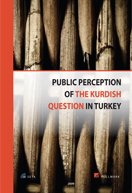The meeting between Prime Minister Recep Tayyip Erdoğan and President George W. Bush at the White House last Monday was expected to be a turning point for Turkey’s war on Kurdistan Workers’ Party (PKK) terrorism as well as for US-Turkish relations; at least some on the Turkish side thought so. While Prime Minister Erdoğan said he was happy with the outcome of the meeting, it is simplistic to interpret this as a watershed event in US-Turkish relations.
What was wrong from the very beginning was the high level of expectations. The meeting between US Secretary of State Condoleezza Rice and Turkish Foreign Minister Ali Babacan in Ankara preceded the meeting at the White House. Did it yield any concrete results? Not really, at least not according to the statements made by the foreign minister. Both Rice and Babacan reiterated their resolve against terrorism. They emphasized the significance of the strategic partnership between the US and Turkey. But none of this has led to a new action plan.
The expanded conference of Iraq’s neighboring countries in İstanbul, an initiative started by Turkey several years ago, brought together 17 countries from the region as well as the permanent members of the UN Security Council. Many feared that the PKK issue would dominate the agenda and leave little room for other issues. While bringing up the PKK issue under the rubric of terrorism in Iraq, the Turkish side was careful not to let the PKK hijack the meeting.
The White House meeting did not propose a new roadmap other than appointing the number-two officers in the US and Turkish militaries to work together against the PKK bases in northern Iraq. Intelligence sharing between the two countries is probably the most concrete measure that came out of the meeting. While this is all good, it is also ironic that the US administration, which considers Turkey to be a “strategic partner”, has admitted it has not shared intelligence with Turkey so far.
The Bush administration does not want to lose Turks and Kurds at the same time. If it is forced to make a choice, it will choose Turkey in the long run. But northern Iraq is Bush’s only success story in Iraq. There is also talk of stationing US troops in the Kurdish regional administration This proposal is fraught with potentialities that could prove good or bad for Turkish-US relations.
For the optimist, a sizeable US military presence in northern Iraq would help Turkey in its war on the PKK. A functional US-Turkish cooperation could prevent PKK terrorists from using the Iraqi territory to launch attacks on Turkey. For the pessimist, however, the same military presence is a tacit green light for the gradual creation of an independent Kurdish state.
The problem is that the only way diplomacy will work and Turkey will not resort to military action in northern Iraq is if the Iraqi Kurdish leadership takes strong action against the PKK in their midst. While the difficulties of containing the PKK in Iraq are obvious, it is not an impossible task. What will bring the Kurdish leaders to take that step?
It depends on a number of measures. The Kurdish leaders want recognition from Turkey, which the Turkish government refuses to grant on the grounds that the regional Kurdish administration must first act to stop the PKK. The Turkish side is also concerned that talking directly to the Kurdish regional administration will further weaken Baghdad. The government of Prime Minister Nouri al-Maliki is not strong enough to pressure the Kurds to do something against the PKK.
The only remaining option is US pressure. Will President Bush go the extra mile and have a serious talk with the Kurdish regional administration. This is the first critical question. The second critical question is whether the Kurdish regional administration will listen.
Unless we have clear answers to these questions, the Turkish government will be forced to declare diplomacy null and void. Coming back to Prime Minister Erdoğan’s sta









